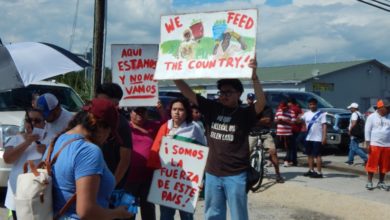Seven
hundred people gathered on both sides of the U.S./Mexico border fence so those
on the U.S. side could send a message to those standing in violence-plagued Ciudad
Juárez: You are not alone.
The primary source of violence in Juárez has been the brutal “war on drugs” policies implemented by the U.S. and Mexican governments. More than 3,000 people were killed in 2010.
Seven police cars and about a dozen Border Patrol
vehicles surrounded the protest on the U.S. side, while in Mexico, a single
Policía Federal truck drove up and quickly left.
Protesters from Juárez climbed the fence to look over the
crowd, but none tried to cross the border. Bottles of water and other objects
were passed back and forth across the fence until the Border Patrol made an
announcement that demonstrators could not do this. The Border Patrol also asked
people to stay away from the fence unless in small groups, a request that was
roundly ignored by people on both sides.
The demonstration, held on Saturday, Jan. 29, was
organized by a student-run action group called Peace and Justice Sin Fronteras,
which rose from a grassroots starting point of three people several months ago
to build a coalition capable of mobilizing hundreds to denounce violence in Juárez.
A table set up by Peace and Justice Sin Fronteras on
the U.S. side offered spray-paint and stencils for demonstrators to paint signs
and t-shirts. Stencils included a raised fist and the slogan “¡Ya Basta!” or
“Stop Now!” The table also had a cloth for people to write messages, where one
child wrote “I miss – Ciudad Juárez, J Town, Juaritos.”
Student organizer Christina Garcia, a founding
member of Peace and Justice Sin Fronteras, said the event was inspired by a
history of activism in Mexico.
“In
Mexico they say, they go to a protest and they scream, and they say ‘if they
can’t hear us screaming, we’ll scream louder,’” she said. “It’s a way for
people to not become desensitized, and not to ignore it, and if this is the
only thing we can do, we’ll just keep doing it.”
University
of Texas, El Paso Professor Howard Campbell, another founding member of Peace
and Justice Sin Fronteras, spoke at the demonstration, calling for changes in
U.S. drug policy and an end to U.S. military aid to Mexico. He said he hoped
the demonstration would have a powerful effect on national leaders on both
sides of the border.
Peace
and Justice Sin Fronteras was able to mobilize such a large crowd for the
demonstration because many people in the border region feel helpless about the
situation, and are searching for an outlet to express frustration, Campbell
said.
“I
think a lot of people have this pent-up anger and sadness and frustration over
the violence in Juárez. And so we started to galvanize that,” he said.
The Albuquerque chapter of the PSL traveled to the
demonstration in Sunland Park, N.M., with a half-dozen representatives. The
group collected over 100 signatures of fellow activists ready to be mobilized
in the Las Cruces/El Paso area.
The PSL made connections with other activists
including the Border Servant Corps, a group that provides legal aid to
undocumented-resident women that suffer domestic violence, and the Comité de Justicia Laboral (Labor Justice Committee), which provides
extra-legal help to victims of wage theft.
Wage
theft, according to CJL member Shalini Thomas, is the nonpayment or partial
payment of money owed to a worker. She said this is commonly done to
undocumented workers in El Paso because they are often reluctant to contact
authorities due to fear of deportation, and the CJL pressures employers to pay
back wages owed to their workers.
“We
use non-legal, not illegal but non-legal, means to recover those wages, because
often, employers think there’s not going to be any repercussions, there’s not
going to be any consequences if they don’t pay,” Thomas said. “So we show them,
somebody is paying attention… everyone deserves a living wage regardless of
what their immigration status is.”
The
CJL makes repeated phone calls and even house visits to employers until the
wages are paid, Thomas said. She said it’s important for radical organizations,
like the CJL and Peace and Justice Sin Fronteras, to network and form
coalitions to further their mutual goals.
“I
think we’re all fighting for the same issues. We’re fighting for justice,
whether it’s labor justice or immigration justice,” she said.
Kathleen
Stephan, from the Border Servant Corps, agreed, and added that it was important
to show support and solidarity with those who experience the violence in Juárez
as a daily reality.
“I
think it’s important to come and show your support, especially on the U.S.
side, whether you want to show your support for immigration reform or just
solidarity with the divergent experience in Juárez,” she said. “It’s important
to show that you’re aware of what’s going on and you care, and even though
there’s a fence, it doesn’t stop us from caring about it.”





